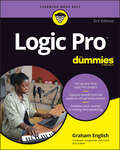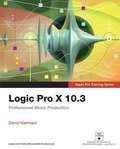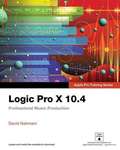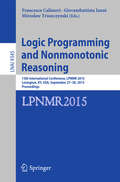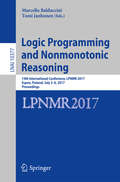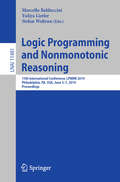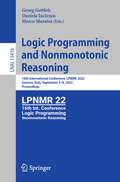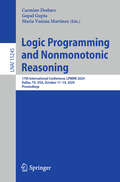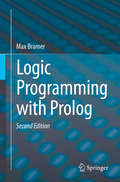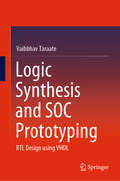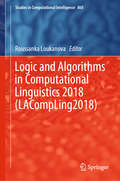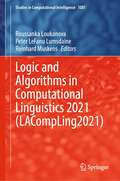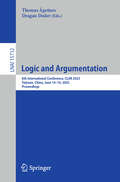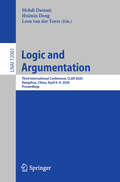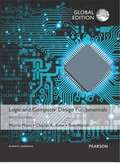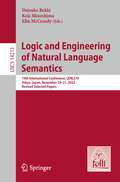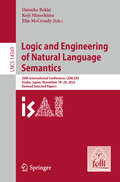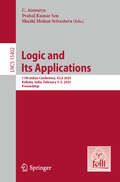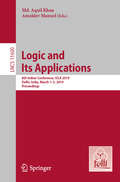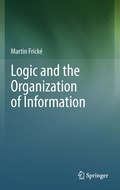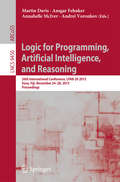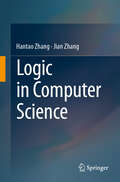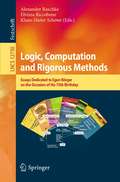- Table View
- List View
Logic Pro For Dummies
by Graham EnglishThis one-stop source for Logic Pro insight helps you spend more time creating music Every minute you spend trying to figure out how to set up a new track or build a drum loop is a minute you don’t spend creating and recording your music. This guide to the recording software favored by Mac users helps you bypass the time needed to search for tech answers and spend more time capturing sounds. Discover the full recording power of Logic Pro, starting with launching a project and recording your audio. Explore the built-in digital instruments and beat makers, augment your recording power with plug-ins, and finalize your song by editing, adding effects, mixing, mastering, and sharing. The final step is music stardom! Learn your way around the Logic Pro interface and understand the workflow Set up your project and add tracks and regions Record acoustic audio or conduct your orchestra of MIDI instruments Edit, mix, automate, export, and feel proud of your audio filesFor beginning music creators and producers, this Dummies guide makes it simple to get started with Logic Pro.
Logic Pro X 10. 3 - Apple Pro Training Series: Professional Music Production (Apple Pro Training )
by David Nahmani<P>The Apple-Certified Way to Learn <P>Record, arrange, mix, produce, and polish your music with this bestselling, Apple-certified guide to Logic Pro X 10.3. Veteran producer and composer David Nahmani uses step-by-step, project-based instructions and straightforward explanations to teach everything from basic music creation to sophisticated production techniques. Using the book’s downloadable lesson files and Logic Pro X, you’ll begin making music in the first lesson. <P>From there, you’ll learn to record audio and MIDI, create and edit sequences, and master mixing and automation techniques such as submixing with Track Stacks or the practical uses of true stereo panning. You will create both acoustic and electronic virtual drum performances using Drummer tracks with Drum Kit Designer and Drum Machine Designer. You’ll use Logic Pro X MIDI plug-ins and Smart Controls to control software synthesizers from a MIDI controller or an iPad. Flex Time will allow you to precisely edit the timing of notes inside an audio recording, and you’ll explore Flex Pitch to correct the pitch of a vocal recording. Finally, you’ll mix, automate, and master the song, using plug-ins to process only selected sections or entire tracks, giving your audio creations the final polish needed to achieve a professional sound. <P>Downloadable lesson and media files allow you to perform the hands-on exercises. <br>Focused lessons take you step by step through practical, real-world tasks. <br>Ample illustrations help you master techniques fast. <br>Lesson goals and time estimates help you plan your time. <br>Chapter review questions help you prepare for the Logic Pro X 10.3 certification exam. <P>The Apple Pro Training Series is both a self-paced learning tool and the official curriculum of the Apple Training and Certification program. Upon completing the course material in this guide, you can become Apple Certified by passing the Logic Pro X 10.3 certification exam at an Apple Authorized Training Provider. To find an Apple Authorized Training Provider near you, please visit training.apple.com. <P>Also in the Apple Pro Training Series: <br>Final Cut Pro X 10.3 <br>Pages, Numbers, and Keynote <br>macOS Support Essentials
Logic Pro X 10. 4 - Apple Pro Training Series: Professional Music Production (Apple Pro Training)
by David NahmaniRecord, arrange, mix, produce, and polish your audio files with this best-selling, Apple-certified guide to Logic Pro X 10.4. Veteran producer and composer David Nahmani uses step-bystep, project-based instructions and straightforward explanations to teach everything from basic music creation to sophisticated production techniques. Using the book’s downloadable lesson files and Logic Pro X, you’ll begin making music in the first lesson. From there, learn to record audio and MIDI data, create and edit sequences, and master mixing and automation techniques such as submixing with track stacks. Create both acoustic and electronic virtual drum performances using Drummer tracks with Drum Kit Designer and Drum Machine Designer. Use Logic Pro X MIDI FX and Smart Controls to control software synthesizers from a MIDI controller or an iPad. Harness the power of Smart Tempo to make sure all recordings, imported audio files, and samples play in time. Flex Time allows you to precisely edit the timing of notes inside an audio recording, and you’ll explore Flex Pitch to correct the pitch of a vocal recording. Finally, you mix, automate, and master the song, using plug-ins to process only selected sections or entire tracks, giving your audio creations the final polish needed to achieve a professional sound. Downloadable lesson and media files allow you to perform the hands-on exercises. Focused lessons take you step by step through practical, real-world tasks. Accessible writing style puts an expert instructor at your side Ample illustrations help you master techniques fast. Lesson goals and time estimates help you plan your time. Chapter review questions summarize what you’ve learned and help you prepare for the Apple certification exam.
Logic Programming and Nonmonotonic Reasoning
by Francesco Calimeri Giovambattista Ianni Miroslaw TruszczynskiThis volume contains the refereed proceedings of the 13th International Conference on Logic Programming and Nonmonotonic Reasoning, LPNMR 2015, held in September 2015 in Lexington, KY, USA. The 290long and 11 short papers presented together with 3 invited talks, the paper reporting on the Answer Set Programming competition, and four papers presented by LPNMR student attendees at the doctoral consortium were carefully reviewed and selected from 60 submissions. LPNMR is a forum for exchanging ideas on declarative logic programming, nonmonotonic reasoning, and knowledge representation. The aim of the LPNMR conferences is to facilitate interactions between researchers interested in the design and implementation of logic-based programming languages and database systems, and researchers who work in the areas of knowledge representation and nonmonotonic reasoning.
Logic Programming and Nonmonotonic Reasoning
by Marcello Balduccini Tomi JanhunenThis Festschrift volume, published in honor of Michael Gelfond on the occasion of his 65th birthday, contains a collection of papers written by his closest friends and colleagues. Several of these papers were presented during the Symposium on Constructive Mathematics in Computer Science, held in Lexington, KY, USA on October 25-26, 2010. The 27 scientific papers included in the book focus on answer set programming. The papers are organized in sections named "Foundations: ASP and Theories of LP, KR, and NMR", "ASP and Dynamic Domains", and "ASP - Applications and Tools".
Logic Programming and Nonmonotonic Reasoning: 15th International Conference, LPNMR 2019, Philadelphia, PA, USA, June 3-7, 2019, Proceedings (Lecture Notes in Computer Science #11481)
by Yuliya Lierler Marcello Balduccini Stefan WoltranThis book constitutes the refereed proceedings of the 15th International Conference on Logic Programming and Nonmonotonic Reasoning, LPNMR 2019, held in Philadelphia, PA, USA, in June 2019.The 22 full papers and 3 short papers presented in this volume were carefully reviewed and selected from a total of 39 submissions. The papers were organized in topical sections named: applications; argumentation; foundations and complexity; knowledge representation and reasoning; and systems.
Logic Programming and Nonmonotonic Reasoning: 16th International Conference, LPNMR 2022, Genova, Italy, September 5–9, 2022, Proceedings (Lecture Notes in Computer Science #13416)
by Marco Maratea Georg Gottlob Daniela InclezanThis book constitutes the refereed proceedings of the 16th International Conference on Logic Programming and Nonmonotonic Reasoning, LPNMR 2022, held in Genova, Italy, in September 2022. The 34 full papers and 5 short papers included in this book were carefully reviewed and selected from 57 submissions. They were organized in topical sections as follows: Technical Contributions; Systems; Applications.
Logic Programming and Nonmonotonic Reasoning: 17th International Conference, LPNMR 2024, Dallas, TX, USA, October 11–14, 2024, Proceedings (Lecture Notes in Computer Science #15245)
by Maria Vanina Martinez Gopal Gupta Carmine DodaroThis book constitutes the refereed proceedings of the 17th International Conference on Logic Programming and Nonmonotonic Reasoning, LPNMR 2024, held in Dallas, TX, USA, during October 11-14, 2024. The 27 full papers and 3 short papers included in this book were carefully reviewed and selected from 48 submissions. They deal with declarative logic programming, non-monotonic reasoning, and knowledge representation, focusing on the design and implementation of logic-based programming languages and database systems.
Logic Programming with Prolog
by Max BramerLogic Programming is the name given to a distinctive style of programming, very different from that of conventional programming languages such as C++ and Java. By far the most widely used Logic Programming language is Prolog. Prolog is a good choice for developing complex applications, especially in the field of Artificial Intelligence. Logic Programming with Prolog does not assume that the reader is an experienced programmer or has a background in Mathematics, Logic or Artificial Intelligence. It starts from scratch and aims to arrive at the point where quite powerful programs can be written in the language. It is intended both as a textbook for an introductory course and as a self-study book. On completion readers will know enough to use Prolog in their own research or practical projects. Each chapter has self-assessment exercises so that readers may check their own progress. A glossary of the technical terms used completes the book. This second edition has been revised to be fully compatible with SWI-Prolog, a popular multi-platform public domain implementation of the language. Additional chapters have been added covering the use of Prolog to analyse English sentences and to illustrate how Prolog can be used to implement applications of an 'Artificial Intelligence' kind. Max Bramer is Emeritus Professor of Information Technology at the University of Portsmouth, England. He has taught Prolog to undergraduate computer science students and used Prolog in his own work for many years.
Logic Synthesis and SOC Prototyping: RTL Design using VHDL
by Vaibbhav TaraateThis book describes RTL design, synthesis, and timing closure strategies for SOC blocks. It covers high-level RTL design scenarios and challenges for SOC design. The book gives practical information on the issues in SOC and ASIC prototyping using modern high-density FPGAs. The book covers SOC performance improvement techniques, testing, and system-level verification. The book also describes the modern Xilinx FPGA architecture and their use in SOC prototyping. The book covers the Synopsys DC, PT commands, and use of them to constraint and to optimize SOC design. The contents of this book will be of use to students, professionals, and hobbyists alike.
Logic and Algebraic Structures in Quantum Computing
by Jennifer Chubb Ali Eskandarian Valentina HarizanovArising from a special session held at the 2010 North American Annual Meeting of the Association for Symbolic Logic, this volume is an international cross-disciplinary collaboration with contributions from leading experts exploring connections across their respective fields. <P><P>Themes range from philosophical examination of the foundations of physics and quantum logic, to exploitations of the methods and structures of operator theory, category theory, and knot theory in an effort to gain insight into the fundamental questions in quantum theory and logic. The book will appeal to researchers and students working in related fields, including logicians, mathematicians, computer scientists, and physicists. A brief introduction provides essential background on quantum mechanics and category theory, which, together with a thematic selection of articles, may also serve as the basic material for a graduate course or seminar.
Logic and Algorithms in Computational Linguistics 2018 (Studies in Computational Intelligence #860)
by Roussanka LoukanovaThis book focuses mainly on logical approaches to computational linguistics, but also discusses integrations with other approaches, presenting both classic and newly emerging theories and applications.Decades of research on theoretical work and practical applications have demonstrated that computational linguistics is a distinctively interdisciplinary area. There is convincing evidence that computational approaches to linguistics can benefit from research on the nature of human language, including from the perspective of its evolution.This book addresses various topics in computational theories of human language, covering grammar, syntax, and semantics. The common thread running through the research presented is the role of computer science, mathematical logic and other subjects of mathematics in computational linguistics and natural language processing (NLP). Promoting intelligent approaches to artificial intelligence (AI) and NLP, the book is intended for researchers and graduate students in the field.
Logic and Algorithms in Computational Linguistics 2021 (Studies in Computational Intelligence #1081)
by Reinhard Muskens Roussanka Loukanova Peter LeFanu LumsdaineThis book assesses the place of logic, mathematics, and computer science in present day, interdisciplinary areas of computational linguistics. Computational linguistics studies natural language in its various manifestations from a computational point of view, both on the theoretical level (modeling grammar modules dealing with natural language form and meaning and the relation between these two) and on the practical level (developing applications for language and speech technology). It is a collection of chapters presenting new and future research. The book focuses mainly on logical approaches to computational processing of natural language and on the applicability of methods and techniques from the study of formal languages, programming, and other specification languages. It presents work from other approaches to linguistics, as well, especially because they inspire new work and approaches.
Logic and Argumentation: 6th International Conference, CLAR 2025, Taiyuan, China, June 14–16, 2025, Proceedings (Lecture Notes in Computer Science #15712)
by Thomas Ågotnes Dragan DoderThis book constitutes the refereed proceedings of the 6th International Conference on Logic and Argumentation, CLAR 2025, held in Taiyuan, China, during June 14–16, 2025. The 22 full papers included in this book were carefully reviewed and selected from 38 submissions. These papers focus on the recent advancements in the field of logic and argumentation, as well as their applications in various areas of Artificial intelligence (AI), such as explainable AI, ethical dilemmas, reasoning about uncertainty and knowledge representation.
Logic and Argumentation: Third International Conference, CLAR 2020, Hangzhou, China, April 6–9, 2020, Proceedings (Lecture Notes in Computer Science #12061)
by Mehdi Dastani Huimin Dong Leon van der TorreThis book constitutes the refereed proceedings of the Third International Conference on Logic and Argumentation, CLAR 2020, held in Hangzhou, China, in April 2020. The 14 full and 7 short papers presented were carefully reviewed and selected from 31 submissions. The papers cover the focus of the CLAR series, including formal models of argumentation, logics for decision making and uncertainreasoning, formal models of evidence, con rmation, and justi cation, logics forgroup cognition and social network, reasoning about norms, formal representationsof natural language and legal texts, as well as applications of argumentationon climate engineering.
Logic and Computer Design Fundamentals
by Charles R. Kime Tom Martin M. Morris ManoFor courses in Logic and Computer design. Understanding Logic and Computer Design for All Audiences Logic and Computer Design Fundamentals is a thoroughly up-to-date text that makes logic design, digital system design, and computer design available to students of all levels. The Fifth Edition brings this widely recognized source to modern standards by ensuring that all information is relevant and contemporary. The material focuses on industry trends and successfully bridges the gap between the much higher levels of abstraction students in the field must work with today than in the past. Broadly covering logic and computer design, Logic and Computer Design Fundamentals is a flexibly organized source material that allows instructors to tailor its use to a wide range of student audiences.
Logic and Engineering of Natural Language Semantics: 19th International Conference, LENLS19, Tokyo, Japan, November 19–21, 2022, Revised Selected Papers (Lecture Notes in Computer Science #14213)
by Daisuke Bekki Koji Mineshima Elin McCreadyThis volume LNCS 14213 constitutes the refereed proceedings of the 19th International Conference, LENLS 2019, held in November 2022, in Tokyo, Japan. The 13 full papers presented were carefully reviewed and selected from 34 submissions. The conference focuses on theoretical and computational linguistics covering topics ranging from syntax, semantics, and pragmatics to the philosophy of language and natural language processing.
Logic and Engineering of Natural Language Semantics: 20th International Conference, LENLS20, Osaka, Japan, November 18–20, 2023, Revised Selected Papers (Lecture Notes in Computer Science #14569)
by Daisuke Bekki Koji Mineshima Elin McCreadyThis book constitutes the refereed post-conference proceedings of the 20th International Conference, LENLS20, held in Osaka, Japan, during November 18-20, 2023. The 19 full papers presented were carefully reviewed and selected from 46 submissions. The conference aims to cover the topics at the Intersection of Language and logic, and so Centers Around Linguistics, both Theoretical and Computational; Logic; Philosophy; and other sorts of Formal Approaches to these topics such as Game Theory.
Logic and Its Applications: 11th Indian Conference, ICLA 2025, Kolkata, India, February 3–5, 2025, Proceedings (Lecture Notes in Computer Science #15402)
by Shashi Mohan Srivastava C. Aiswarya Prabal Kumar SenThis book constitutes the refereed proceedings of the 11th Indian Conference on Logic and Its Applications, ICLA 2025, held in Kolkata, India, during February 3–5, 2025. Four out the five invited talks are included in this book. Out of the 26 submissions, the program committee carefully selected 14 papers to be included in the proceedings. The topics included are Mathematics, Computer Science, Philosophy, Linguistics and Cognitive Science. A special feature of ICLA is the inclusion of studies in systems of logic in the Indian tradition, as well as historical research on logic.
Logic and Its Applications: 8th Indian Conference, ICLA 2019, Delhi, India, March 1-5, 2019, Proceedings (Lecture Notes in Computer Science #11600)
by Md. Aquil Khan Amaldev ManuelThis book collects the refereed proceedings of the 8th Indian Conference on Logic and Its Applications, ICLA 2019, held in Delhi, India, in March 2019. The volume contains 13 full revised papers along with 6 invited talks presented at the conference. The aim of this conference series is to bring together researchers from a wide variety of fields in which formal logic plays a significant role. Areas of interest include mathematical and philosophical logic, computer science logic, foundations and philosophy of mathematics and the sciences, use of formal logic in areas of theoretical computer science and artificial intelligence, logic and linguistics, and the relationship between logic and other branches of knowledge. Of special interest are studies in systems of logic in the Indian tradition, and historical research on logic.
Logic and the Organization of Information
by Martin FrickéLogic and the Organization of Information closely examines the historical and contemporary methodologies used to catalogue information objects--books, ebooks, journals, articles, web pages, images, emails, podcasts and more--in the digital era. This book provides an in-depth technical background for digital librarianship, and covers a broad range of theoretical and practical topics including: classification theory, topic annotation, automatic clustering, generalized synonymy and concept indexing, distributed libraries, semantic web ontologies and Simple Knowledge Organization System (SKOS). It also analyzes the challenges facing today's information architects, and outlines a series of techniques for overcoming them. Logic and the Organization of Information is intended for practitioners and professionals working at a design level as a reference book for digital librarianship. Advanced-level students, researchers and academics studying information science, library science, digital libraries and computer science will also find this book invaluable.
Logic for Programming, Artificial Intelligence, and Reasoning
by Martin Davis Andrei Voronkov Ansgar Fehnker Annabelle MciverThis book constitutes the proceedings of the 20thInternational Conference on Logic for Programming, Artificial Intelligence, andReasoning, LPAR-20, held in November 2015, in Suva, Fiji. The 43 regular papers presented together with 1 invitedtalk included in this volume were carefully reviewed and selected from 92submissions. The series of International Conferences on Logic for Programming,Artificial Intelligence and Reasoning, LPAR, is a forum where, year after year,some of the most renowned researchers in the areas of logic, automatedreasoning, computational logic, programming languages and their applicationscome to present cutting-edge results, to discuss advances in these fields, andto exchange ideas in a scientifically emerging part of the world.
Logic in Computer Science
by Jian Zhang Hantao ZhangMathematical logic is an important basis for mathematics, computer science and artificial intelligence alike. This book provides a comprehensive introduction to various logics, including classical propositional logic and first-order predicate logic, as well as equational logic, temporal logic, and Hoare logic. In addition, it presents proof procedures for classical logics and decision procedures for checking the satisfiability of logical formulas. The book assumes no background in logic. It presents logics as practical tools for solving various problems in artificial intelligence and formal verification. Accordingly, it is well suited for (junior and senior) undergraduate and graduate students majoring in computer science or mathematics. Each chapter includes roughly a dozen exercise problems, so as to help the reader understand the concepts and techniques discussed.
Logic in Computer Science: Modelling and Reasoning about Systems
by Mark Ryan Michael HuthIn recent years, powerful tools for verifying hardware and software systems have been developed. Major companies, such as Intel, Siemens, BT, AT & T, and IBM have increasingly become interested in that technology. Students need a basic formal training that allows them to gain sufficient proficiency in using logic-based verification methods. This book addresses these needs by providing a sound basis in logic and an introduction to the logical frameworks used in modeling, specifying and verifying computer systems. Coverage provides a simple and clear presentation, detailing propositional and predicate logic as well as some specialized logics used for reasoning about the correctness of computer systems. The authors introduce a carefully chosen core of essential terminology; further technicalities are introduced only where they are required by the applications. Numerous examples are given, as well as a full exposition of a fast-growing technique for modeling and verifying computer systems, known as symbolic model checking. It will be an ideal introduction for undergraduate students. A worldwide web tutorial that supports the course activities and provides solutions to the sample exercises is available to instructors.
Logic, Computation and Rigorous Methods: Essays Dedicated to Egon Börger on the Occasion of His 75th Birthday (Lecture Notes in Computer Science #12750)
by Klaus-Dieter Schewe Alexander Raschke Elvinia RiccobeneThis Festschrift was published in honor of Egon Börger on the occasion of his 75th birthday.It acknowledges Prof. Börger's inspiration as a scientist, author, mentor, and community organizer. Dedicated to a pioneer in the fields of logic and computer science, Egon Börger's research interests are unusual in scope, from programming languages to hardware architectures, software architectures, control systems, workflow and interaction patterns, business processes, web applications, and concurrent systems.The 18 invited contributions in this volume are by leading researchers in the areas of software engineering, programming languages, business information systems, and computer science logic.
